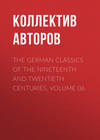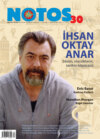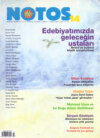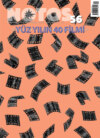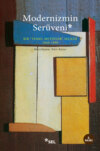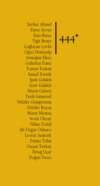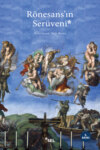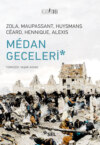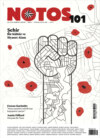Kitabı oku: «The German Classics of the Nineteenth and Twentieth Centuries, Volume 06», sayfa 7
* * * * *
The company around the table gradually became better acquainted and much noisier. Wine banished beer, punch-bowls steamed, songs were sung, and brotherhood was drunk in true student fashion. The old "Landsfather toast" and the beautiful songs of W. Müller, Rückert, Uhland, and others rang out with the exquisite airs of Methfessel. Best of all sounded our own Arndt's German words, "The Lord, who bade iron grow, wished for no slaves." And out of doors it roared as if the old mountain sang with us, and a few reeling friends even asserted that he merrily shook his bald head, which caused the great unsteadiness of the floor of our room.
* * * * *
During this crazy scene, in which plates learned to dance and glasses to fly, there sat opposite me two youths, beautiful and pale as statues, one resembling Adonis, the other Apollo. The faint rosy hue which the wine spread over their cheeks was scarcely noticeable. They gazed on each other with infinite affection, as if the one could read in the eyes of the other, and in those eyes there was a light as though drops of light had fallen therein from the cup of burning love, which an angel on high bears from one star to the other. They conversed softly with earnest trembling voices, and narrated sad stories, through all of which ran a tone of strange sorrow. "Lora is dead now too!" said one, and, sighing, proceeded to tell of a maiden of Halle who had loved a student, and who, when the latter left Halle, spoke no more to any one, ate but little, wept day and night, gazing over on the canary-bird which her lover had given her. "The bird died, and Lora did not long survive it," was the conclusion, and both the youths sighed as though their hearts would break. Finally the other said, "My soul is sorrowful; come forth with me into the dark night! Let me inhale the breath of the clouds and the moon-rays. Companion of my sorrow! I love thee; thy words are musical, like the rustling of reeds and the flow of rivulets; they reëcho in my breast, but my soul is sad!"
Both of the young men arose. One threw his arm around the neck of the other, and thus they left the noisy room. I followed, and saw them enter a dark chamber, where the one by mistake, instead of the window, threw open the door of a large wardrobe, and both, standing before it with outstretched arms, expressing poetic rapture, spoke alternately. "Ye breezes of darkening night," cried the first, "how ye cool and revive my cheeks! How sweetly ye play amid my fluttering locks! I stand on the cloudy peak of the mountain; far below me lie the sleeping cities of men, and blue waters gleam. List! far below in the valley rustle the fir-trees! Far above yonder hills sweep in misty forms the spirits of our fathers. Oh, that I could hunt with ye on your cloud-steeds through the stormy night, over the rolling sea, upwards to the stars! Alas! I am laden with grief, and my soul is sad!" Meanwhile, the other had also stretched out his arms toward the wardrobe, while tears fell from his eyes as he cried to a pair of yellow leather pantaloons which he mistook for the moon, "Fair art thou, daughter of heaven! Lovely and blessed is the calm of thy countenance. Thou walkest in loveliness! The stars follow thy blue path in the east! At thy glance the clouds rejoice, and their dark forms gleam with light. Who is like unto thee in heaven, thou the night-born? The stars are ashamed before thee, and turn away their sparkling eyes. Whither, ah, whither, when morning pales thy face, dost thou flee from thy path? Hast thou, like me, thy Halle? Dwellest thou amid shadows of sorrow? Have thy sisters fallen from heaven? Are they who joyfully rolled with thee through the night now no more? Yea, they have fallen down, oh! lovely light, and thou hidest thyself often to bewail them! Yet the night must come at last when thou too will have passed away, and left thy blue path above in heaven. Then the stars, that were once ashamed in thy presence, will raise their green heads and rejoice. But now art clothed in thy beaming splendor and gazest down from the gate of heaven. Tear aside the clouds, oh! ye winds, that the night-born may shine forth and the bushy hills gleam, and that the foaming waves of the sea may roll in light!"
* * * * *
I can bear a tolerable quantity—modesty forbids me to say how many bottles—and I consequently retired to my chamber in tolerably good condition. The young merchant already lay in bed, enveloped in his chalk-white night-cap and saffron yellow night-shirt of sanitary flannel. He was not asleep, and sought to enter into conversation with me. He was from Frankfurt-on-the-Main, and consequently spoke at once of the Jews, declared that they had lost all feeling for the beautiful and noble, and that they sold English goods twenty-five per cent. under manufacturers' prices. A fancy to humbug him came over me, and I told him that I was a somnambulist, and must beforehand beg his pardon should I unwittingly disturb his slumbers. This intelligence, as he confessed the following day, prevented him from sleeping a wink through the whole night, especially since the idea had entered his head that I, while in a somnambulistic state, might shoot him with the pistol which lay near my bed. But in truth I fared no better myself, for I slept very little. Dreary and terrifying fancies swept through my brain….
From this confusion I was rescued by the landlord of the Brocken, when he awoke me to see the sun rise. On the tower I found several people already waiting, and rubbing their freezing hands; others, with sleep still in their eyes, stumbled up to us, until finally the whole silent congregation of the previous evening was reassembled, and we saw how, above the horizon, there rose a little carmine-red ball, spreading a dim, wintry light. Far around, amid the mists, rose the mountains, as if swimming in a white rolling sea, only their summits being visible, so that we could imagine ourselves standing on a little hill in the midst of an inundated plain, in which here and there rose dry clods of earth. To retain what I saw and felt, I sketched the following poem:
In the east 'tis ever brighter,
Though the sun gleams fitfully;
Far and wide the mountain summits
Swim above the misty sea.
Had I seven-league boots for travel,
Like the fleeting winds I'd rove
Over valley, rock, and river,
To the home of her I love.
From the bed where now she's sleeping
Soft the curtain I would slip;
Softly kiss her childlike forehead,
Kiss the ruby of her lip.
Yet more softly would I whisper
In the little lily ear,
"Think in dreams we still are loving,
Think I never lost thee, dear."
Meanwhile my longing for breakfast was also great, and, after paying a few compliments to my ladies, I hastened down to drink coffee in the warm public room. It was full time, for all within me was as sober and as sombre as in the St. Stephen's Church at Goslar. But with the Arabian beverage, the warm Orient thrilled through my limbs, Eastern roses breathed forth their perfumes, sweet bulbul songs resounded, the students were changed to camels, the Brocken housemaids, with their Congreverocket-glances, became houris, the Philistine noses, minarets, etc.
But the book which lay near me, though full of nonsense, was not the Koran. It was the so-called "Brocken-book," in which all travelers who ascend the mountain write their names—most inscribing their thoughts, or, in default thereof, their "feelings." Many even express themselves in verse. In this book one may observe the horrors which result when the great Philistine host on opportune occasions, such as this on the Brocken, becomes poetic. The palace of the Prince of Pallagonia never contained such absurdities as are to be found in this book. Those who shine in it with especial splendor are Messrs. the excise collectors, with their moldy "high inspirations;" counter-jumpers, with their pathetic outgushings of the soul; old German revolution dilettanti with their Turner-Union phrases, and Berlin school-masters with their unsuccessful efforts at enthusiasm. Mr. Snobbs will also for once show himself as author. In one page the majestic splendor of the sunrise is described, in another complaints occur of bad weather, of disappointed hopes, and of the mists which obstruct the view. A "Caroline" writes that in climbing the mountain her feet got wet, to which a naïve "Nanny," who was impressed by this, adds, "I too, got wet while doing this thing." "Went up wet without and came down wet within," is a standing joke, repeated in the book hundreds of times. The whole volume smells of beer, tobacco and cheese; we might fancy it one of Clauren's novels.
* * * * *
And now the students prepared to depart. Knapsacks were buckled, the bills, which were moderate beyond all expectation, were settled, the susceptible housemaids, upon whose countenances the traces of successful amours were plainly visible, brought, as is their custom, their Brocken-bouquets, and helped some to adjust their caps; for all of which they were duly rewarded with either kisses or coppers. Thus we all went down the mountain, albeit one party, among whom were the Swiss and Greifswalder, took the road toward Schierke, and the others, about twenty men, among whom were my fellow "countrymen" and myself, led by a guide, went through the so-called "Snow Holes" down to Ilsenburg.
Such a head-over-heels, break-neck piece of business! Halle students travel quicker than the Austrian militia. Ere I knew where I was, the bald summit of the mountain, with groups of stones strewed over it, was behind us, and we went through the fir-wood which I had seen the day before. The sun poured down a cheerful light on the merry Burschen, in gaily colored garb, as they merrily pressed onward through the wood, disappearing here, coming to light again there, running across marshy places on trunks of trees, climbing over shelving steeps by grasping the projecting tree-roots; while they thrilled all the time in the merriest manner and received as joyous an answer from the twittering wood-birds, the invisibly plashing rivulets, and the resounding echo. When cheerful youth and beautiful nature meet, they mutually rejoice.
The lower we descend the more delightfully did subterranean waters ripple around us; only here and there they peeped out amid rocks and bushes, appearing to be reconnoitring if they might yet come to light, until at last one little spring jumped forth boldly. Then followed the usual show—the bravest one makes a beginning, and then to their own astonishment the great multitude of hesitators, suddenly inspired with courage, rush forth to join the first. Myriads of springs now leaped in haste from their ambush, united with the leader, and finally formed quite an important brook, which, with its innumerable waterfalls and beautiful windings, ripples down the valley. This is now the Ilse—the sweet, pleasant Ilse. She flows through the blest Ilse vale, on whose sides the mountains gradually rise higher and higher, being clad even to their base with beech-trees, oaks, and the usual shrubs, the firs and other needle-covered evergreens having disappeared; for that variety of trees grows preferably upon the "Lower Harz," as the east side of the Brocken is called in contradistinction to the west side or Upper Harz. Being in reality much higher, it is therefore better adapted to the growth of evergreens.
It is impossible to describe the merriment, simplicity, and charm with which the Ilse leaps down over the fantastically shaped rocks which rise in her path, so that the water strangely whizzes or foams in one place. amid rifted rocks, and in another pours forth in perfect arches through a thousand crannies, as if from a giant watering-pot, and then, lower down, trips away again over the pebbles like a merry maiden. Yes, the old legend is true; the Ilse is a princess, who, in the full bloom of youth, runs laughing down the mountain side. How her white foam garment gleams in the sunshine! How her silvered scarf flutters in the breeze! How her diamonds flash! The high beech-trees gaze down on her like grave fathers secretly smiling at the capricious self-will of a darling child; the white birch-trees nod their heads like delighted aunts, who are, however, anxious at such bold leaps; the proud oak looks on like a not over-pleased uncle, who must pay for all the fine weather; the birds joyfully sing their applause; the flowers on the bank whisper, "Oh, take us with thee, take us with thee, dear sister!" But the merry maiden may not be withheld, and she leaps onward and suddenly seizes the dreaming poet, and there streams over me a flower-rain of ringing gleams and flashing tones, and my senses are lost in all the beauty and splendor, and I hear only the voice, sweet pealing as a flute—
I am the Princess Ilse,
And dwell in Ilsenstein;
Come with me to my castle,
Thou shalt be blest—and mine!
With ever-flowing fountains
I'll cool thy weary brow;
Thou'lt lose amid their rippling
The cares which grieve thee now.
In my white arms reposing,
And on my snow-white breast,
Thou'lt dream of old, old legends,
And sing in joy to rest.
I'll kiss thee and caress thee,
As in the ancient day
I kissed the Emperor Henry,
Who long has passed away.
The dead are dead and silent,
Only the living love;
And I am fair and blooming—
Dost feel my wild heart move!
And as my heart is beating,
My crystal castle rings,
Where many a knight and lady
In merry measure springs.
Silk trains are softly rustling,
Spurs ring from night to morn,
And dwarfs are gaily drumming,
And blow the golden horn.
As round the Emperor Henry,
My arms round thee shall fall;
I held his ears—he heard not
The trumpet's warning call.
We feel infinite happiness when the outer world blends with the world of our own soul, and green trees, thoughts, the songs of birds, gentle melancholy, the blue of heaven, memory, and the perfume of herbs, run together in sweet arabesques. Women best understand this feeling, and this may be the cause that such a sweet incredulous smile plays around their lips when we, with scholastic pride, boast of our logical deeds—how we have classified everything so nicely into subjective and objective; how our heads are provided, apothecary-like, with a thousand drawers, one of which contains reason, another understanding, the third wit, the fourth bad wit, and the fifth nothing at all—that is to say, the Idea.
As if wandering in dreams, I scarcely observed that we had left the depths of the Ilsethal and were now again climbing uphill. This was steep and difficult work, and many of us lost our breath; but, like our late lamented cousin, who now lies buried at Moelln, we thought in advance of the descent, and were all the merrier in consequence. Finally we reached the Ilsenstein.
This is an enormous granite rock, which rises boldly on high from out a glen. On three sides it is surrounded by high woody hills, but on the fourth, the north side, there is an open view, and we gazed past the Ilsenburg and the Ilse lying below us, far away into the low lands. On the towerlike summit of the rock stands a great iron cross, and in case of need there is also room here for four human feet. And as Nature, through picturesque position and form, has adorned the Ilsenstein with fantastic charms, so legend likewise has shed upon it a rosy shimmer. According to Gottschalk, "People say that there once stood here an enchanted castle, in which dwelt the rich and fair Princess Ilse, who still bathes every morning in the Ilse. He who is fortunate enough to hit upon the exact time and place will be led by her into the rock where her castle lies and receive a royal reward." Others narrate a pleasant legend of the lovers of the Lady Ilse and of the Knight of Westenberg, which has been romantically sung by one of our most noted poets in the Evening Journal. Others again say that it was the Old Saxon Emperor Henry who had a royal good time with the water-nymph Ilse in her enchanted castle.
A later author, one Niemann, Esq., who has written a Guide to the Harz in which the height of the hills, variations of the compass, town finances, and similar matters are described with praiseworthy accuracy, asserts, however, that "what is narrated of the Princess Ilse belongs entirely to the realm of fable." Thus do all men speak to whom a beautiful princess has never appeared; but we who have been especially favored by fair ladies know better. And the Emperor Henry knew it too! It was not without cause that the Old Saxon emperors were so attached to their native Harz. Let any one only turn over the leaves of the fair Lüneburg Chronicle, where the good old gentlemen are represented in wondrously true-hearted woodcuts sitting in full armor on their mailed war-steeds, the holy imperial crown on their beloved heads, sceptre and sword in firm hands; and then in their dear mustachiod faces he can plainly read how they often longed for the sweet hearts of their Harz princesses, and for the familiar rustling of the Harz forests, when they sojourned in distant lands—yes, even when in Italy, so rich in oranges and poisons, whither they, with their followers, were often enticed by the desire of being called Roman emperors, a genuine German lust for title, which finally destroyed emperor and empire.
I, however, advise every one who may hereafter stand on the summit of the Ilsenstein to think neither of emperor nor empire nor of the fair Ilse, but simply of his own feet. For as I stood there, lost in thought, I suddenly heard the subterranean music of the enchanted castle, and saw the mountains around begin to stand on their heads, while the red-tiled roofs of Ilsenburg were dancing, and green trees flew through the air, until all was green and blue before my eyes, and I, overcome by giddiness, would assuredly have fallen into the abyss, had I not, in the dire need of my soul, clung fast to the iron cross. No one who reflects on the critically ticklish situation in which I was then placed can possibly find fault with me for having done this.
* * * * *
BOYHOOD DAYS55
By Heinrich Heine
Translated by Charles Godfrey Leland
The town of Düsseldorf is very beautiful, and if you think of it when far away, and happen at the same time to have been born there, strange feelings come over your soul. I was born there, and feel as if I must go straight home. And when I say home I mean the Bolkerstrasse and the house in which I was born. This house will some day be a great curiosity, and I have sent word to the old lady who owns it that she must not for her life sell it. For the whole house she would now hardly get as much as the tips which the distinguished green-veiled English ladies will one day give the servant girl when she shows them the room where I was born, and the hen-house wherein my father generally imprisoned me for stealing grapes, and also the brown door on which my mother taught me to write with chalk—O Lord! Madame, should I ever become a famous author, it has cost my poor mother trouble enough.
(1823-1826)
But my fame as yet slumbers in the marble quarries of Carrara; the waste-paper laurel with which they have bedecked my brow has not yet spread its perfume through the wide world, and the green-veiled English ladies, when they come to Düsseldorf as yet leave the celebrated house unvisited, and go directly to the market-place and there gaze on the colossal black equestrian statue which stands in its midst. This is supposed to represent the Prince Elector, Jan Wilhelm. He wears black armor and a long wig hanging down his back. When a boy, I heard the legend that the artist who made this statue became aware, to his horror, while it was being cast, that he had not metal enough to fill the mold, and then all the citizens of the town came running with all their silver spoons, and threw them in to make up the deficiency; and I often stood for hours before the statue wondering how many spoons were concealed in it, and how many apple-tarts the silver would buy. Apple-tarts were then my passion—now it is love, truth, liberty, and crab-soup—and not far from the statue of the Prince Elector, at the theatre corner, generally stood a curiously constructed bow-legged fellow with a white apron, and a basket girt around him full of delightfully steaming apple-tarts, whose praises he well knew how to call out in an irresistible high treble voice, "Here you are! hot apple-tarts! just from the oven—smelling deliciously!" Truly, whenever in my later years the Evil One sought to get the better of me, he always spoke in just such an enticing high treble voice, and I should certainly have never remained twelve full hours with the Signora Giulietta, if she had not thrilled me with her sweet perfumed apple-tart tones. And, in fact, the apple-tarts would never have so sorely tempted me if the crooked Hermann had not covered them up so mysteriously with his white apron; and it is aprons, you know, which—but I wander from the subject. I was speaking of the equestrian statue which has so many silver spoons in it, and no soup, and which represents the Prince Elector, Jan Wilhelm.
He was a brave gentleman, 'tis reported, a lover of art and handy therein himself. He founded the picture-gallery in Düsseldorf; and in the observatory there, they still show us an extremely artistic piece of work, consisting of one wooden cup within another which he himself had carved in his leisure hours, of which latter he had every day four-and-twenty.
In those days princes were not the harassed creatures they now are. Their crowns grew firmly on their heads, and at night they drew nightcaps over them besides and slept in peace, and their people slumbered calmly at their feet; and when they awoke in the morning they said, "Good morning, father!" and the princes replied, "Good morning, dear children!"
But there came a sudden change over all this, for one morning when we awoke in Düsseldorf and wanted to say, "Good morning, father!" the father had traveled away, and in the whole town there was nothing but dumb sorrow. Everywhere there was a sort of funereal atmosphere, and people crept silently through the market and read the long placard placed on the door of the City Hall. The weather was dark and lowering, yet the lean tailor Kilian stood in the nankeen jacket, which he generally wore only at home, and in his blue woolen stockings, so that his little bare legs peeped out dismally, and his thin lips quivered as he murmured the words of the placard to himself. An old invalid soldier from the Palatine read it in a somewhat louder tone, and at certain phrases a transparent tear ran down his white, honorable old mustache. I stood near him, and wept with him, and then asked why we wept; and he replied, "The Prince Elector has abdicated." Then he read further, and at the words "for the long-manifested fidelity of my subjects," "and hereby release you from your allegiance," he wept still more. It is a strange sight to see, when so old a man, in faded uniform, with a scarred veteran's face, suddenly bursts into tears. While we read, the Princely Electoral coat-of-arms was being taken down from the City Hall, and everything began to appear as oppressively desolate as though we were waiting for an eclipse of the sun. The city councilors went about at an abdicating, slow gait; even the omnipotent beadle looked as though he had had no more commands to give, and stood calmly indifferent, although the crazy Aloysius again stood upon one leg and chattered the names of French generals, with foolish grimaces, while the tipsy, crooked Gumpertz rolled around the gutter, singing, "Ça ira! Ça ira!" But I went home, weeping and lamenting because "the Prince Elector had abdicated!" My mother tried hard to comfort me, but I would hear nothing. I knew what I knew, and went weeping to bed, and in the night dreamed that the world had come to an end—that all the fair flower gardens and green meadows were taken up from the ground and rolled away, like carpets; that a beadle climbed up on a high ladder and took down the sun, and that the tailor Kilian stood by and said to himself, "I must go home and dress myself neatly, for I am dead and am to be buried this afternoon." And it grew darker and darker—a few stars glimmered meagrely on high, and these too, at length, fell down like yellow leaves in autumn; one by one all men vanished, and I, poor child, wandered around in anguish, and finally found myself before the willow fence of a deserted farmhouse, where I saw a man digging up the earth with a spade, and near him an ugly, spiteful-looking woman, who held something in her apron like a human head—but it was the moon, and she laid it carefully in the open grave—and behind me stood the Palatine invalid, sighing, and spelling out "The Prince Elector has abdicated."
When I awoke the sun shone as usual through the window, there was a sound of drums in the street, and as I entered the sitting-room and said "good morning" to my father, who was sitting in his white dressing-gown, I heard the little light-footed barber, as he dressed his hair, narrate very minutely that allegiance would be sworn to the Grande Duke Joachim that morning at the City Hall. I heard, too, that the new ruler was of excellent family, that he had married the sister of the Emperor Napoleon, and was really a very respectable man; that he wore his beautiful black hair in flowing locks, that he would shortly make his entrance into the town, and, in fine, that he was sure to please all the ladies. Meanwhile the drumming in the streets continued, and I went out before the house-door and looked at the French troops marching in that joyous people of glory, who, singing and playing, swept over the world, the serious and yet merry-faced grenadiers, the bear-skin shakoes, the tri-colored cockades, the glittering bayonets, the voltigeurs, full of vivacity and point d'honneur, and the omnipotent giant-like silver-laced tambour major, who could cast his baton with a gilded head as high as the first story, and his eyes even to the second, where also there were pretty girls sitting at the windows. I was so glad that soldiers were to be quartered in our house—in which my mother differed from me—and I hastened to the market-place. There everything looked changed, somewhat as though the world had been newly whitewashed. A new coat-of-arms was placed on the City Hall, its iron balconies were hung with embroidered velvet drapery. French grenadiers stood as sentinels; the old city councilors had put on new faces, and donned their Sunday coats, and looked at each other Frenchily, and said, "Bonjour!" Ladies gazed from every window, curious citizens and glittering soldiers filled the square, and I, with other boys, climbed on the great bronze horse of the Prince Elector, and thence stared down on the motley crowd.
Our neighbors, Pitter and the tall Kunz, nearly broke their necks in accomplishing this feat, and it would have been better if they had been killed outright, for the one afterwards ran away from his parents, enlisted as a soldier, deserted, and was finally shot at Mayence; while the other, having made geographical researches in strange pockets, was on this account elected active member of a public treadmill institute. But having broken the iron bands which bound him to the latter and to his fatherland, he safely crossed the channel, and eventually died in London through wearing an all too tight neck-tie which automatically drew together, when a royal official removed a plank from beneath his feet.
Tall Kunz told us that there was no school today on account of the ceremonies connected with taking the oath of allegiance. We had to wait a long time ere these commenced. Finally, the balcony of the City Hall was filled with gaily dressed gentlemen, with flags and trumpets, and our burgomaster, in his celebrated red coat, delivered an oration, which stretched out like Indian rubber, or like a knitted nightcap into which one has thrown a stone—only that it was not the philosopher's stone—and I could distinctly understand many of his phrases—for instance, that "we are now to be made happy;" and at the last words the trumpets sounded out, the flags were waved, the drums were beaten, the people cried, Hurrah! and while I myself cried hurrah, I held fast to the old Prince Elector. And it was really necessary that I should, for I began to grow giddy. It seemed to me as if the people were standing on their heads, because the world whizzed around, while the old Prince Elector, with his long wig, nodded and whispered, "Hold fast to me!" and not till the cannon reechoed along the wall did I become sobered, and climbed slowly down from the great bronze horse.
As I went home, I saw the crazy Aloysius again dancing on one leg, while he chattered the names of French generals, and I also beheld crooked Gumpertz rolling in the gutter and growling, "Ça ira, ça ira," and I said to my mother, "We are all to be made happy; on that account there is no school today."
II
The next day the world was again all in order, and we had school as before, and things were learned by heart as before—the Roman kings, dates, the nomina in im, the verba irregularia, Greek, Hebrew, geography, German, mental arithmetic—Lord! my head is still giddy with it!—all had to be learned by heart. And much of it was eventually to my advantage; for had I not learned the Roman kings by heart, it would subsequently have been a matter of perfect indifference to me whether Niebuhr had or had not proved that they never really existed. And had I not learned those dates, how could I ever, in later years, have found out any one in big Berlin, where one house is as like another as drops of water or as grenadiers, and where it is impossible to find a friend unless you have the number of his house in your head! At that time I associated with every acquaintance some historical event, which had happened in a year corresponding to the number of his house, so that the one recalled the other, and some curious point in history always occurred to me whenever I met any one whom I visited. For instance, when I met my tailor, I at once thought of the battle of Marathon; when I saw the well-groomed banker, Christian Gumpel, I immediately remembered the destruction of Jerusalem; when I caught sight of a Portuguese friend, deeply in debt, I thought at once of the flight of Mahomet; when I met the university judge, a man whose probity is well known, I thought of the death of Haman; and as soon as I laid eyes on Wadzeck, I was at once reminded of Cleopatra. Ah, heaven! the poor creature is dead now; our tears are dry, and we may say of her with Hamlet, "Taken all in all, she was an old woman; we oft shall look upon her like again!" But, as I said, dates are necessary. I know men who had nothing in their heads but a few dates, and with their aid knew where to find the right houses in Berlin, and are now already regular professors. But oh, the trouble I had at school with the multitude of numbers; and as to actual arithmetic, that was even worse! I understood best of all subtraction, and for this there is a very practical rule: "Four can't be taken from three, therefore I must borrow one"; but I advise all in such a case to borrow a few extra groschen, for no one can tell what may happen.
